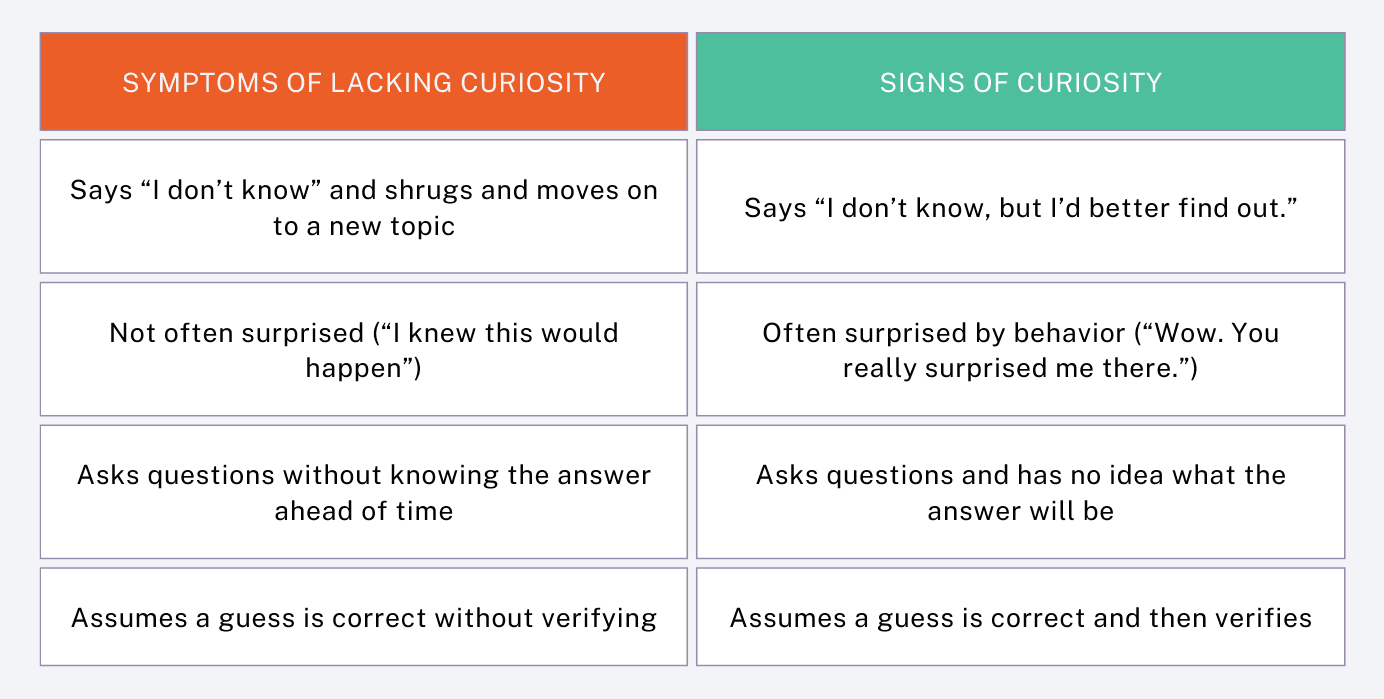Just curious: how curious are you?
Story
A senior leader was concerned that her team was not motivated to improve their performance.
“They just want to continue their comfortable jobs and not learn anything new!” she vented. “They’re not motivated to improve.”
We asked this leader, “What are they motivated by?”
“I don’t know. Just getting their stable salary and going home, I guess.”
That was the assumption she was making about them, and it’s actually a pretty good guess. But the key is: it’s still a guess.
The Downside of Being a Good Guesser
Experienced leaders—and we work with some of the best of the best—got to where they are by guessing well. They can “see around corners” or even appear to see the future. This makes them extremely valuable to their organizations.
However, there’s a danger: good guessers often over-rely on their own insights and lose curiosity.
“We take pride in making rapid progress, which promotes a false sense of mastery. That jump-starts an overconfidence cycle, preventing us from doubting what we know and being curious about what we don’t.” Adam Grant. Think Again: The Power of Knowing What You Don’t Know, 2021
Curiosity Quick Checklist:

The Problem
What’s so bad about lacking curiosity? There are at least 4 pitfalls to watchout for
- Acting on bad “data”
- Reduced delegation
- Stifling creativity
- Sense of exclusion
Bad data
When a recent client was trying to improve retention, they thought they had pinpointed the most important factor that would move the needle. Here are a few examples they may have come up with: remote work hours vs. on-site hours, personal and professional development budget per person, you get the idea.
They had good data but were missing asking a very simple next question before acting: how do we know this is the right metric to adjust? That simple “extra credit” curiosity got them to realize the data they were about to act on had a very serious flaws (mainly to do with the way it was collected and who exactly it impacted).
Delegation
Needing to delegate more is a common need among all leaders. But what is it exactly that is stopping them from delegating. It might be easy for them to say, “I just don’t trust that my team will do it better than I would.” That’s a good start, but let’s go for extra credit and be a bit more curious about that.
For example, does that apply to everyone equally on the team? What would help you trust one or more of them more? What do they think about being delegated to?
Engaging curiously with those sorts of questions has cured many of our clients from delegation phobia.
Creativity
Open discussion about topics no one is sure about (especially the leader) can lead to new ideas and innovations that would never have come up without curiosity. How many “brain storming” meetings have you been in where people sort of throw some ideas around and then the leaders pick their favorites (possibly the ones they contributed) and then we move on to the next topic? While not the only possible problem, that scenario is often a symptom of lacking curiosity.
If instead the leader can say: “I really don’t know what to do about this” or even “I’m not entirely sure what to focus on, what do you think?” that can lead to huge gains in innovation that may have been missed by simply not asking the question. One client decided to have a “Wonder Wednesday” in which they all spent time asking open questions and seeing where it would lead. They were impressed at how quickly new high-quality ideas emerged.
Exclusion
When you’re curious about people, what makes them tick, and why they do what they do, you naturally come across as more inclusive. People from all cultures are delighted to explain their culture to those who are genuinely curious about it. Inversely, if you never show any curiosity about someone they may feel excluded or rejected.
When someone who appears to think or act differently than you expect, that’s the perfect chance for a genuine question: “I noticed you did this and I’m really curious to know what was the thinking behind that.”
Bonus tip: Notice the deliberate avoidance of “why” in that question. Using other ways to ask “why” is generally a more inclusive way to show curiosity. Role play it yourself. How do you feel being asked with and without “why” in the question?
What ever happened…
To leader with the team who just wanted a comfortable job with no challenges? To leader with the team who just wanted a comfortable job with no challenges? We helped by running a motivation profile for them and then worked with the whole team to match their work with their passions.
It ended up being way more complicated than the black-and-white picture painted by the senior leader. And that’s the joy of curiosity: it’s a key to unlock a more colorful and ultimately more truthful view of reality. That’s where the real progress can be made.
Next Steps?
How can you and your team increase curiosity?
Book a free 20-minute call with one of our coaches to discuss how we can support you to make your next big breakthrough (even if it feels impossible right now).
Note: Our Adaptive Leaders team works across more than 15 industries, in multiple countries, and often deals with highly confidential information. The examples and case studies in these stories have been modified slightly to protect the identities of the clients.












